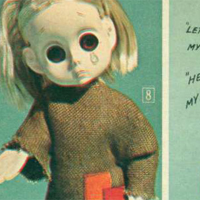Peter Falk credits fans for Columbo's lasting legacy
"I'm just so grateful toward them."

The first time we see Peter Falk as Columbo, he walks into a luxury apartment, his tan trenchcoat draped over his arm, a cigar clenched between his teeth, and every hair on his head in place over a neat suit.
In the pilot episode of Columbo, a two-hour movie called "Prescription: Murder," Peter Falk had yet to establish all of the minor details of his character's very particular quirks, including his famously disheveled appearance. We've noted before that Columbo writer Steven Bochco has said that inventing the character of Columbo required the writers to under-write his quirks, so it makes sense he was a little underdeveloped at the start.
This left room for Falk to play, which Bochco said the actor was going to do whether the character was written quirky or not, and so the danger in writing out certain quirks was Falk going beyond what was written and taking the character way over the top.
So in "Prescription: Murder," Falk hasn't yet perfected the character and so Columbo instead looks neat and stylish when he's introduced about 32 minutes into the episode. The first words he speaks are an address to a suspect:
"Dr. Flemming?" he calls to a man we've just watched casually walking about what's clearly marked as a murder scene.
The doctor takes a menacing step toward Falk and asks in a confrontational tone, "Who are you?"
"Lieutenant Columbo, police," Falk responds, unfazed.
Columbo then reveals to the doctor that his wife has been brutally attacked in an attempted murder. The doctor seems shocked to hear his wife survived and Columbo seems to note this by stabbing his cigar back between his lips. These kinds of quirks don’t just tell us who he is. They show us how he thinks.
As the doctor in this first Columbo scene grows more suspicious in his questions and actions, Columbo's demeanor shifts. Re-watching, you can really get into this first moment when Falk showed us how his character catches onto funny business regarding a crime.
At one point in this delicious scene, we can hear a phone conversation where the doctor is clearly covering up what's being said on the other side of the line.
Of course, Columbo can't hear that the doctor is lying, but we know, so when Columbo crosses his arms and raises his head, still chomping that cigar, his posture portrays that he detects the lie.
It's the first spark the audience has of true belief in Columbo's crime-solving instincts. And it comes without speaking a line at all. That was the marvel of watching Peter Falk work.
Just a few minutes later, it becomes apparent that Columbo is skilled in absorbing information without giving a tell that he's caught on. As an audience, we start to see how Columbo dances with suspects during a very special moment that introduces one of Columbo's longest-running quirks.
It happens when Columbo is leaving the suspect at the hospital where his wife is in a coma, about 36 minutes into the episode.
By this point, Columbo has asked nothing of the doctor except to eventually make a list of any belongings the attacker might have stolen from his home. The doctor is squirming to get away from Columbo, and Columbo pulls out a pad casually to ask a few questions for his report.
Then he starts patting down his coat. His front pocket is stuffed full of cigars, and he comes up empty in this search.
"Gee, you don't have a pencil, do you?" Columbo asks the doctor, beginning a long pattern of deception the detective uses to give the illusion of being ill-equipped to analyze a case.
And then just a few beats later, we hear Columbo's catchphrase for the first time when Falk lets the suspect walk away and then hastily stops him, saying, "Oh, oh, one more thing."
Richard Levinson once explained that this catchphrase wasn't invented for any purpose. It was, like most things about the character of Columbo, completely unplanned.
"When Bill [Link] and I were writing the play, we had a scene that was too short, and we already had Columbo make an exit," Levinson said. "We were too lazy to retype the scene, so we had him come back and say, 'Oh, just one more thing…' It was never planned."
In an interview for a TV special celebrating 50 years of Columbo, Falk said it was these kinds of quirks that gave Columbo such a lasting legacy, with fans coming back to watch him borrow pens and wave around that cigar, season after season.
"I think having the brains of Sherlock Holmes, but dressing like the gardener," Falk explained, shows that "he's a very average guy. But what sets him apart is this brain. He's really curious, and he's got eyes like an eagle. He can see things and he smells things and he hears things, and that quality makes him different."
"You and me and everybody, we're worried about the impression that we make when we meet other people," Falk went on. "We want other people to think that we're wonderful, that we're successful. Columbo doesn't care that you think he's a little slow."
Falk thanked fans who have caught on to what he did that made Columbo such a singular character in pop history. "I'm just so grateful toward them," Falk said.
It's wild to think that he had no idea during these very first moments in "Prescription: Murder" that these quirks would inevitably make Columbo so eternally watchable.
"I guess it's the nature of that character," Falk said. "He's very comfortable with himself. There's not a pretentious bone in his body."







13 Comments

https://columbophile.com/columbo-episode-list/
And if you subscribe, CP emails a weekly post, one episode at a time.


































